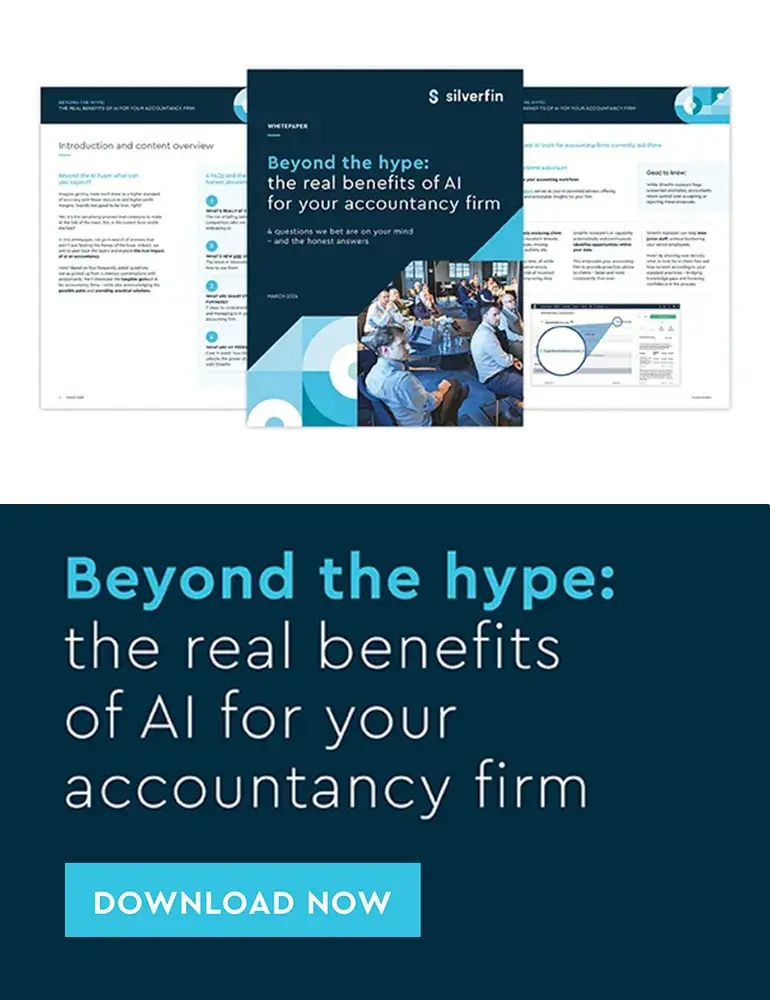Known for its ease and widespread usage, Excel is the first tool most accountants become proficient in. Yet, as your accounting firm expands and client demands increase, Excel’s initial advantages can quickly become drawbacks as growth introduces complexity that Excel isn’t built to handle.
Error-prone processes become a nuisance and a hazard that can balloon into financial misreports or compliance mishaps. These are not just minor inconveniences; they can lead to significant financial losses and damage your firm’s reputation.
As Excel’s limitations become more apparent, the question is no longer “Excel vs accounting software, which is better?” but when to move to a more sophisticated solution and to which one.
This is where modern cloud-based software designed for accounting firms comes into play, offering a solution to growing pains and a pathway to elevate your competitive strategy.
Accounting Software vs Excel: The Limitations of Excel
While Excel offers familiarity and cost-effectiveness, these strengths are overshadowed by the efficiency, accuracy, and collaboration capabilities found in modern accounting software.
Transitioning to new systems can be seen as risky or costly, and many firms continue using Excel to maintain continuity.
However, as firms grow and regulatory demands increase, the cracks in relying solely on Excel begin to show – especially if it’s tied to desktops.
Error-Prone Processes
Manual data entry and complex formulas make Excel highly error-prone, whereas accounting software minimises errors by automating key processes.
Research indicates that almost 90% of all spreadsheets contain errors due to human error that could have been avoided.
These mistakes can cascade through linked worksheets and compound in reports, leading to significant financial discrepancies and compliance risks that threaten your firm’s reputation, data integrity, and profitability.
For example, JP Morgan relied on Excel for key financial modelling, such as its value-at-risk (VaR) calculations—however, the process involved manually copying and pasting data across several spreadsheets.
An employee made the mistake of pasting the sum of two figures rather than the average, underestimating the risk exposure and resulting in the bank taking much larger and riskier positions, causing a $6 billion loss.
All because of faulty Excel spreadsheets.
Lack of Real-Time Collaboration
Does your firm rely on collaboration between different team members, departments, and clients? Then, Excel spreadsheets may not be the best solution.
The software is typically meant for single users, and while recent versions offer multi-user features, it doesn’t solve the problem of inefficient data consolidation.
With multiple people needing to contribute to client files, spreadsheet data in Excel is susceptible to duplication, the risk of incorrect data entry, accidental data loss and maintaining version control.
When working with large data sets, your firm may spend more time on data consolidation than analysing the data for valuable insights.
In contrast, accounting software’s real-time collaboration capabilities keep workflows efficient and allow your firm to respond quickly to opportunities or risks.
Lack of Standardisation
Excel’s lack of standardisation also poses significant challenges for accounting firms, as highlighted by Mark Thurston, Director at Gascoynes: “In the past, working papers were done in Excel, and, probably, every manager and preparer had a different way of doing things.”
This inconsistency in Excel can make it difficult to ensure one way of working across the firm and impact the quality and accuracy of working papers. The absence of a standardised format also complicates training and onboarding new staff, as they must adapt to various personal styles and systems within the firm.
The Advantages of Cloud-Based Financial Reporting Software Over Excel
Transitioning to a cloud-based financial reporting and compliance platform offers numerous advantages that help your firm overcome the limitations of Excel spreadsheets.
Efficiency and Accuracy
Cloud-based solutions like Silverfinautomate essential tasks like data entry, reconciliations, and compliance checks, which are traditionally manual and time-consuming in Excel. For example, it streamlines data entry, reconciliations and compliance checks, reducing the risk of human error and freeing up your team’s time to focus on higher-value activities.
“If you’re doing work for a client on a quarterly or a monthly basis, the ability to just roll that data forward via Silverfin when you come into a new period versus a very manual process with Excel is done at the click of a button and accurately,” explains Mark Thurston.
“Because of the standardised approach, everything looks the same. Your fixed asset registers all look the same, so you know exactly what you’re looking for and where it would be. Plus, a lot of it is automated. Silverfin calculates tiny details like your accruals. It’s not done by one of your colleagues on a calculator mistyping figures—everything is automated, massively improving accuracy.”
Real-Time Data and Collaboration
Cloud-first platforms offer real-time data updates and effortless collaboration for team members, regardless of location, keeping everyone on the same page with the latest information – something Excel users can struggle with.
This capability is especially crucial as remote work continues to rise in popularity. Cloud software ensures that everyone is looking at the most current data, leading to better-informed decisions and the agility of your firm.
“Live data links are a real-time saver for any firm,” says Mark Thurston. “They remove the need to constantly import and export trial balances or push adjustments.”
“We also no longer have to pull information out and drop it into another piece of software,” Chris Reeve, Managing Director of Gascoynes, highlights. “Which saves us even more time.”
Compliance and Security
Accounting software offers built-in compliance and robust security measures that Excel lacks, safeguarding your firm’s sensitive financial data and ensuring regulatory adherence. Excel requires manual oversight to ensure compliance, unlike a cloud-based compliance platform with built-in compliance tools and automatic updates to keep pace with changing regulations.
Additionally, Excel lacks robust security features, making sensitive financial data vulnerable and potentially impacting your firm’s trustworthiness and customer retention.
The Integration of Artificial Intelligence
The integration of AI in accounting software enhances how firms manage and process financial data, enabling new forms of value creation and transcending the capabilities of traditional tools like Excel.
As discussed in our whitepaper, “Beyond The Hype: The Real Benefits of AI for Your Accounting Firm,” artificial intelligence could reduce the time spent on manual tasks by up to 40% by 2034.
“Instead of reviewing the data manually, we ran it through Silverfin Assistant,” Russel Frayne, Director of Transformation at Gravita, explains. “The AI tool ran around 100 checks and spotted three or four opportunities that were ‘nice to know,’ but also four errors that were spot-on. It would have taken an accountant, say, 30 minutes or more to dive into the file and find those anomalies.”
This productivity enhancement, along with improvements in data accuracy and compliance management, underscores the superior capabilities of AI-enhanced software over manual systems like Excel.
Russell further supports this view: “AI should replace processes, not people. If you automate the processes that you spend ages doing manually, you’ll free up time to have more interactions with your clients and take up more of an advisory role.”
Addressing security concerns with AI, Russell explains the importance of understanding where and how client data is used and stored. He advocates for AI tools built into core accounting software already in use, noting the security reassurance provided by in-platform tools like the Silverfin Assistant.
“Silverfin Assistant sits right at the heart of the Silverfin platform, so that’s reassuring,” says Russell. “The software had already gone through due diligence and procurement processes when we adopted it into the business. So, we already knew our data would be safe.”

Excel vs Accounting Software: Making the Right Choice for Growth
Excel has its place, but cloud-based financial reporting and compliance software brings undeniable benefits that empower firms to work smarter, faster, and more securely. A tool like Silverfin can reduce the strain of manual processes, improve data accuracy, and equip your firm with the strategic advantage necessary to thrive in a competitive market.
Frequently Asked Questions
Excel is prone to human error, lacks real-time collaboration features, and isn’t equipped with compliance tools or security features. These limitations can risk data accuracy and hinder a firm’s growth as client needs become more complex.
Cloud-based software like Silverfin offers automation, real-time collaboration, and robust security features, addressing many of Excel’s limitations and helping firms operate more efficiently and securely.
Accounting software automates data entry and calculations, reducing human error and providing reliable financial information that’s always up-to-date.
Switching to accounting software improves efficiency, accuracy, and compliance. It also allows for seamless collaboration and integrates AI for enhanced data insights.
Book your Silverfin demo today and experience firsthand how moving from Excel to a sophisticated cloud-based system can empower your long-term growth and sustainability.














